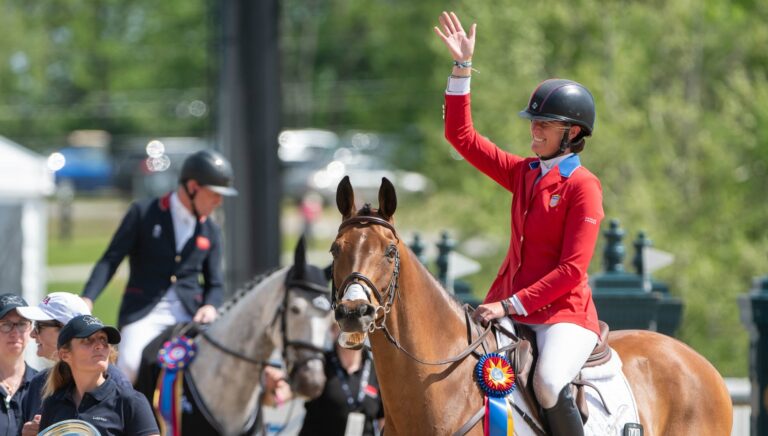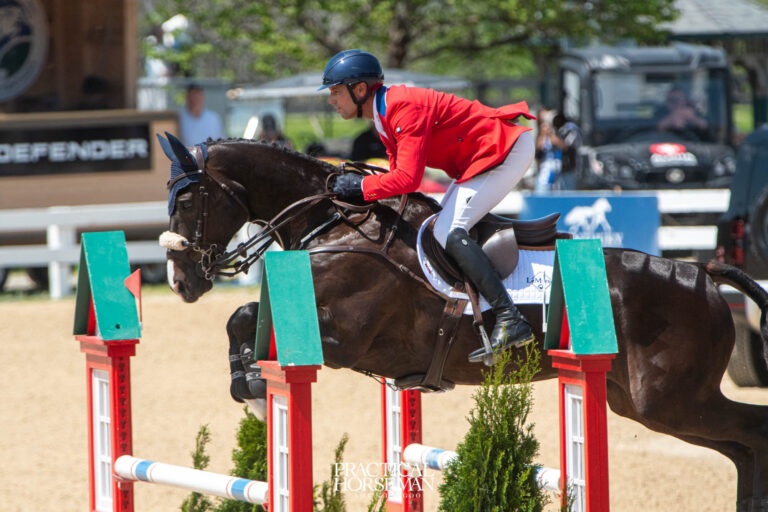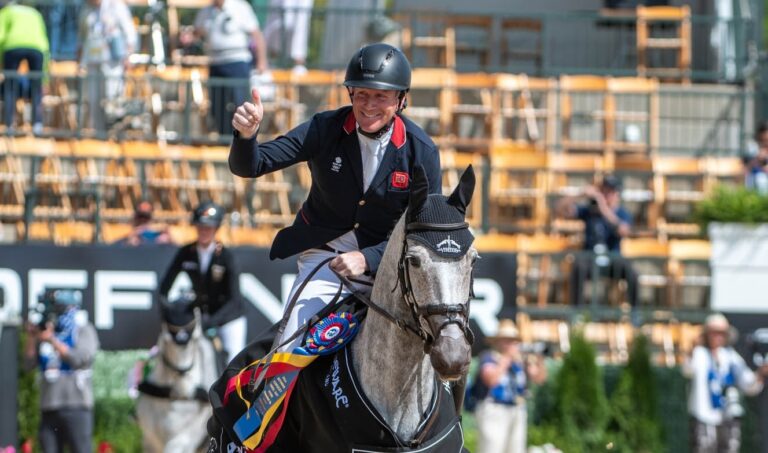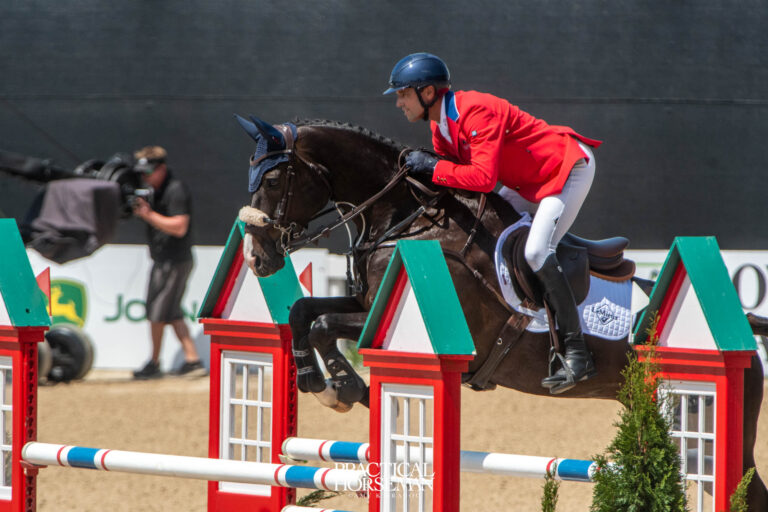
“At the end of the day, I love my horses, I love winning, and you can do both,” says Caroline Pamukcu.
The 30-year-old American eventing star spent the majority of 2022 studying under Olympian Pippa Funnell in England. But Pamukcu brought back much more than training advice from Funnell. One of her biggest takeaways was an ability to embrace her emotional nature while maintaining her competitive attitude—to prioritize her love of horses while also striving for greatness in the sport. Pamukcu has proven that since her time overseas, by claiming individual gold at the 2023 Pan American Games aboard HSH Blake, a 9-year-old Irish Sport Horse gelding owned by Mollie Hoff and Sherrie Martin.
But long before that, Pamukcu née Martin was recognized as a promising talent in U.S. Eventing. As a young rider, she earned numerous titles and championships, including individual and team gold medals at the FEI North American Youth Championships. She was named the U.S. Eventing Association’s Young Rider of the Year twice, as well as Lady Rider of the Year.
Over the past decade, Pamukcu has held a spot on the U.S. Equestrian Federation Developing Rider and Team Training lists every year, marking her as a major asset for the future of U.S. Eventing. Pamukcu has represented the U.S. on multiple Nations Cup Teams, has topped leaderboards countless times and is currently ranked 20th on the FEI Eventing World Athlete Rankings list. Now, her sights are set on a spot on the U.S. Eventing Team for the 2024 Paris Olympic Games.
PH: How did you get the opportunity to ride overseas?
Caroline Pamukcu: I have to thank David O’Connor and the USEA Foundation’s Wilton Fair Fund. They gave me an opportunity to move overseas and base myself with Pippa Funnell. So I slowed down my business, and I moved. It’s one of those moments that everything changed, and luckily it was for the better.
PH: What was your experience like with Pippa?
CP: It was life-changing. In America, I have my business. We have up to 50 horses and 15 people working for me. It’s a big, busy operation, for which I’m grateful. But it went from 50 horses and managing all of that to me and a groom heading overseas with six horses and a really condensed program, telling my business partners and the owner of my horses that we’re going to take a pause on life in America and try to further my education.
It was difficult to change so many things and move away from my husband to throw myself 100% into someone else’s program. I dropped everything I’ve known to follow one person and their ideas and change how I do things on a daily basis. It was one of the most humbling but rewarding experiences of my life.
Even though I was overseas, I wasn’t completely thrown into the deep end. I was still on the USEF Development Program squad, so USEF Eventing Emerging/Development Coach Leslie Law was always checking in. USEF kept an eye on me, making sure if I needed help, that they were there.
But I could talk for like six hours to tell you how amazing Pippa and her program are. She really taught me that I could be a good professional and still love the horses and put the horses first, and still be competitive with love for the horses.

PH: Do you think your mindset has changed following your time with Pippa?
CP: The biggest thing is Pippa was the first female coach I’ve ever had. And for me mentally—I’m a very emotional person—to see someone else just as emotionally attached to their horses and attached to the sport and be so competitive but also emotionally empathetic, it was great and eye-opening. There are so many top athletes who are still stone cold. They’re incredible athletes, but they don’t show any emotion. It’s great for me to see that other part, to know that you can still be that little girl obsessed with your horses and feed them a million carrots and cry when something doesn’t go well. You can be that vulnerable and still win. That was a very cool thing for me to learn.
I’m really trying to be more of an advocate about it and be more open about it. At the end of the day, I love my horses, I love winning and you can do both. You can be as emotional as you want. If your horse gets injured, it’s OK to be emotional. If you wake up and have a bad ride, it’s fine, save it for another day. Just enjoy. Go for a hack sometimes. If you’re having an emotional day, perhaps at the office or at home where you have personal issues going on, it’s OK. You don’t have to be 100% every single day. That doesn’t make you a champion. Showing up and giving your best and loving your horses, having a good connection with them, that will make you the best.
I very much enjoyed my time there. I hope I can keep growing, evolving and incorporating what I learned.
PH: How do you handle your emotions when things aren’t going as planned?
CP: I’m the type of person who really likes routine. If I’m having a bad day, I try to stick to my routine. I really love going to the gym, and I have a trainer who I really mesh well with in a mental way. So I look forward to doing that.
On days when, say, my top horse isn’t performing well or I’m having personal issues, sometimes the fix is as simple as a 5-year-old picking up the right lead in a very good way. Those little victories sometimes make your day.
Also, sometimes selling horses gives me a bit of a rush. I’m like, “I got the deal done. It’s so exciting!” It makes me feel successful, and I do love that.
Then my husband—he’s a saint. He really helps me with the highs and lows. We both try not to get too excited, especially after the Pan American Games. We try to stay grounded as best we can and celebrate the victory a little. We’ve been trying to enjoy life and not put all the pressure on if you win or not.
PH: Can you tell us about your Pan American Games partner, HSH Blake?
CP: We call him “Princess.” He loves his attention. He wants to be the center of the barn all day. And he’s funny to ride at home. He gives you 75%, but when you go into the arena at a show, he wants to win. He is there to win, and there is nothing else that matters. But when I’m home, you could move a flowerpot 2 inches, and it’s a nightmare. He’s like, “How dare you move this flowerpot?” But when you compete, a bomb could go off, chairs could fall down, someone could scream, and he doesn’t care. Nothing matters to him but winning.
I’ve never felt that in a horse. It’s crazy. He has this different gear. I think we both do. We both train hard at home and we want to do our best, but when we go to competitions, especially the big ones, we both shut everything else out and go there to win. We’re like-minded.
PH: What does Blake’s training program look like to keep him competing and successful at the top level?

CP: This stems from Pippa. She did a 180 on my program. We do a lot of old-school trot sets and riding on roads, which a lot of people don’t believe in, but it is a big thing in her program. She’s kept horses on the road for years.
Pippa was the first person and the only female ever to win the Grand Slam of Eventing, and that’s a testament to her program and her horsemanship. I’ve totally taken on board everything she said and taught me.
We do a lot of trot sets and a lot of walking. I just did his first show of the season at Pine Top in February, and we got 18 time faults on cross country. We went slow, I had a loop in the reins. That was only his fourth jump of the year. And he’s done dressage a handful of times. We might do a lot of trotting and do dressage on the side of a hill in a jump saddle, but maybe we’ll practice mostly stretchy trot that day. I try not to do a lot of drilling. I try to just get him fit, make sure he feels well, and go from there.
PH: Do you have the 2024 Paris Olympics on your mind?
CP: Yes. It’s scary to say out loud. I have an incredible horse. Both Blake and I are young, but it’s not out of the question.
A lot of the horses for other countries that ran the Pan Americans, they’re definitely going to be able to go to the Olympics. The difference is the U.S. has a really big depth of horses and very talented riders. So I have to really buckle down and give 200% this year. That’s what we’re going to try to do. And if it works out—great. If not—it is what it is.
The good thing about the U.S. is that there are so many other opportunities. If the Olympics don’t work out, there’s also CHIO Aachen and the U.S. Eventing European Development Tour. But the Olympics would be a dream. How many opportunities will I have to have a horse of such quality as Blake? So, we’re keeping our fingers and toes crossed.










